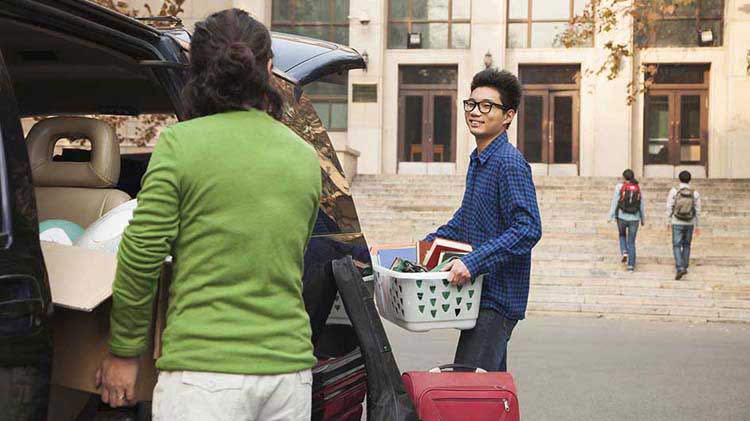Insurance and other tips for college students and their belongings
Understand how your homeowners insurance policy could help protect your college student and their belongings while they're living in a residence hall or dorm room.
Sending your child to college is an experience that may come with exhilaration, stress and a measure of anxiety. Help relieve some of that worry by knowing how your homeowners insurance policy may help protect your student and their belongings while they are away at college.
Does homeowners insurance typically cover college students?
Homeowners insurance policies, including those offered by State Farm®, typically offer coverage for college students. Most companies don't have a coverage specifically titled dorm insurance, but there are options to help cover a college student's belongings. Check with your insurance company for specific information on how coverage is handled for college students. Here are some coverages from a homeowners insurance policy that might extend to a college student:
- Personal liability — the personal liability coverage on your policy may help if a guest is injured in your child's dorm room or if your child accidentally damages school property. The policy may help pay for damages and might even pay for your student's legal defense in the event of a lawsuit.
- Medical payments to others — if the accident in your child's dorm room results in an injury to another, the standard homeowners insurance coverage may help pay for medical expenses and hospital bills incurred.
- Personal property coverage — typically, your homeowners insurance covers your student's personal property inside your student's residence such as clothing, electronics and appliances.
Details tend to vary between homeowners insurance policies and there are often limits in place on personal property coverage outside of the home. Check the specifics of your policy with your agent to find out if your student is covered or whether you might need to purchase additional insurance coverage.
What questions should I consider asking my insurance agent about homeowners insurance and college students?
Before the school year starts, talk to a State Farm agent or another insurance agent to help understand how your homeowners insurance could work with your college student.
- Is the liability limit for an accident in my child's dorm room the same as if one happened in my home? Typically, yes. If you don't feel your current limits will cover your student's liability exposures, you might want to consider a personal umbrella policy.
- What is the personal property coverage for my students belongings while away at school? Perform a home inventory of the items your child is taking to school — a video might be sufficient. If you don't feel the homeowners insurance coverage is adequate, you might consider a personal articles policy to provide additional coverage for electronics, musical instruments or sports equipment.
- Does the homeowners insurance policy cover my student and their property if they live off campus? Typically, no. In this case, you may want to consider looking at renters insurance for your college student. A renters insurance policy could be a cost-effective way to insure your student's property when your student lives off campus in an apartment or rental home.
- What if the car goes with them to college? If your student wants a vehicle on campus, contact your agent to let them know the location of the vehicle and see if adjustments in the auto policy may be necessary.
- What if the car stays at home? If the car will be driven by another driver, they should be listed on the insurance. If it will be parked, it's possible the coverage could be decreased or considered in storage. Either way, discuss with your agent.
What are some college safety tips I can share with my kids?
Review these safety tips with your young adult to help keep them and their belongings secure while they're away from home.
- Tour the campus during the day to familiarize yourself with the facilities.
- Tell a friend or roommate where you're going before venturing out.
- Avoid leaving your electronics, school bag or other belongings unattended.
- Report suspicious people or vehicles to campus security.
- Avoid walking alone on campus, especially at night. If you don't have someone with you, call security and request an escort.
- Travel along well-lit paths around campus rather than taking shortcuts through side streets and alleyways.
- Be alert to your surroundings. Remove your headphones and pocket your phone. Also avoid texting while walking.
- Keep your keys out when walking to your vehicle, dorm or apartment. With keys readily available, it's a little easier for you to get into a safe environment.
- Consider purchasing pepper spray and a whistle to attach to your keychain or store in your bag.
- Lock all doors and windows (especially those on the lower stories of a building) when you're sleeping or you're away from your dorm room. Unattended, open windows that provide easy access/entry can be a tempting target for burglars.
- Never invite strangers into your apartment or residence hall.
- Take an inventory of the items you bring to school. Consider making a quick video of the items and save it to your cloud account or offline storage device for later access if needed. Think about leaving valuables at home, if they are not truly needed at school.
- Document the serial numbers on your electronics. Knowing these numbers could make the items easier to locate if stolen.
- Follow your residence hall's policy for cooking, extension cords and candles. If candles are permitted, keep a close eye while they burn and never leave a candle burning when you're not in the room.
- Only drink if you're of legal age, and do so responsibly. Pour your own beverages, keep track of your glass, and arrange for a designated driver or rideshare service to take you home.




